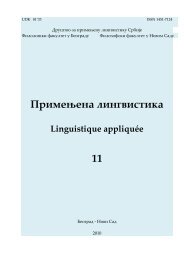Примењена лингвистика у част Ранку Бугарском - Језик у
Примењена лингвистика у част Ранку Бугарском - Језик у
Примењена лингвистика у част Ранку Бугарском - Језик у
You also want an ePaper? Increase the reach of your titles
YUMPU automatically turns print PDFs into web optimized ePapers that Google loves.
Victor A. Friedman: FROM THE BALKANS TO BAHASA: COMPARATIVE ...<br />
languages it is clear that there are about 10,000 lexical items that have entered one<br />
or more of the languages, and of these close to half are ultimately of Arabic origin<br />
(Boretzky 1975, 1976, Dizdari 2005, Knežević 1962, Krăsteva 2000, Latifi 2006,<br />
Grannes, Hauge, and Süleymanoğlu 2002, Jašar-Nasteva 2001, Rolett 1996, Škaljić<br />
1966; cf. also Lokotsch 1927, Miklosich 1884-90, and Friedman 1989).<br />
Since the dissolution of the second Yugoslavia, the standardization of Bosnian<br />
by Bosniac language planners has involved, among other things, a major revival<br />
of Turkisms, especially those of Arabo-Persian origin (on Turkisms in the<br />
Balkans see Kazazis 1972, Friedman 1996). The result then is to bring the most<br />
Muslim-identified of the languages in the Balkans lexically closer to Malaysia the<br />
other end of Eurasia. The parallel does not stop there, however. Just as Malay can<br />
serve the language of Islamic identity and instruction in Southeast Asia outside the<br />
Bahasa region, e.g. in Thailand, Cambodia, Vietnam, and the Philippines (cf. Blust<br />
2009: 58-59), so, too, Bosnian is being promoted as the Muslim language of choice<br />
even in communities where the local dialects are closer to Standard Macedonian<br />
than to any of the Bosnian-Croatian-Serbian-Montenegrin (BCSM) standards. 8 In<br />
Greece, Turkish competes with Greek and Pomak, 9 while among Slavic-speaking<br />
Muslims in Macedonia and Kosovo, Albanian competes with Turkish as well as<br />
Macedonian and Bosnian. 10 And then there is Romani, an Indic language and thus<br />
the source of some loanwords in the Balkans related to Sanskrit. The majority of<br />
Roms in the Ottoman Balkans (which, from a Romani point of view, would mean<br />
those territories that were part of Turkey in 1870) are Muslim, and converts to<br />
Christianity such as the Djorgovci of Southern Serbia (Zlatanović 2006), have lost<br />
Romani, although many other Orthodox Christian Romani groups do keep the language,<br />
and there are Muslim groups that have shifted to Turkish (the so-called Millet<br />
of Bulgaria, see also Marushiakova et al. 2001). 11 Be that as it may, a nuanced<br />
8 Bahasa, a word of Sanskrit origin, means simply ‘language’. I shall return to naming issues later,<br />
but for the moment, the Bahasa region refers to those polities where one or more of the official languages<br />
is based on Riau or Riau-Johor Malay. In the Goran villages of Kosovo, whose dialects were<br />
recognized as part of Macedonian in the 1980s, schools now teach standard Bosnian. In Albanian<br />
Gora, only Albanian is taught in the schools.<br />
9 The Pomaks are Slavic-speaking Muslims particularly concentrated on both sides of the Rhodope<br />
mountains and adjacent regions in Bulgaria and Greece. Their dialects are basically the same as those<br />
of their Christian neighbors and are considered Bulgarian in Bulgaria. In Greece, they are treated as a<br />
separate language when treated at all (Kokkas 2004). They are quite different from Standard Bulgarian,<br />
and even native speakers from other parts of Bulgaria have trouble understanding Rhodopian dialects.<br />
10 Moreover, Turkish and Albanian are also in competition. In Macedonia, Turkish retains its urban<br />
prestige to this day, but the provisions of the Macedonian constitution’s fifth amendment work de<br />
facto in favor of Albanian by specifying certain language rights in terms of 20% of the population.<br />
11 In Greece, except for Western Thrace, Muslim Roms were expelled along with all other Muslims<br />
(except the Albanian-speaking Chams) in the so-called exchange of populations between Greece and<br />
58




